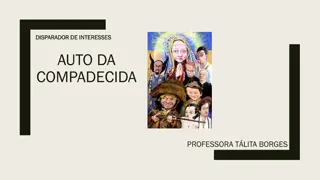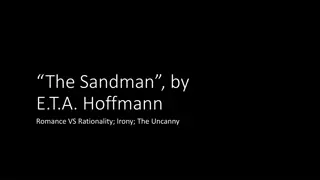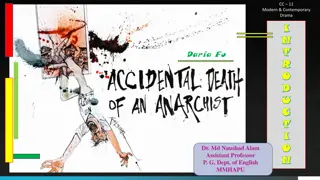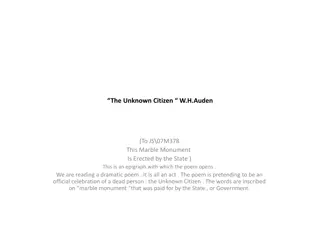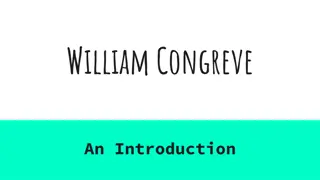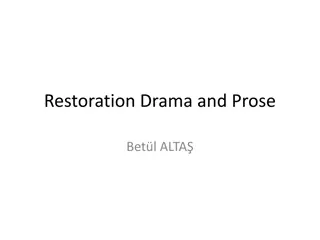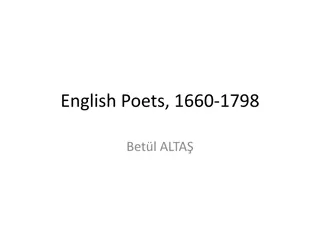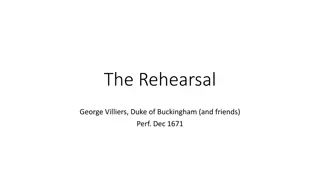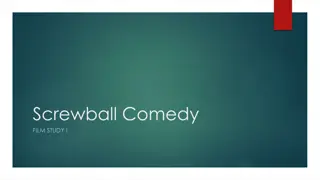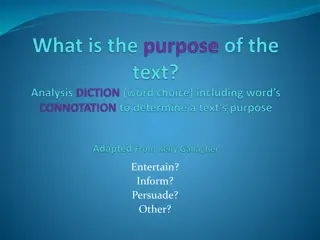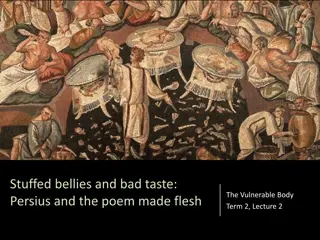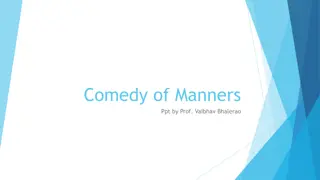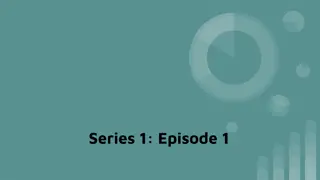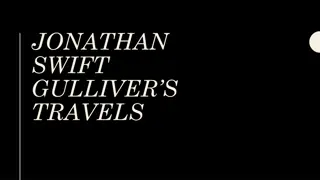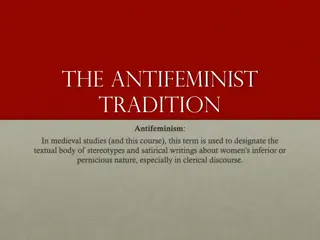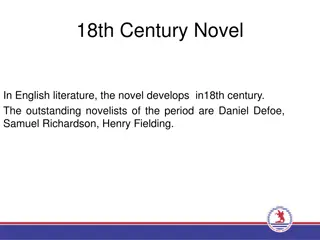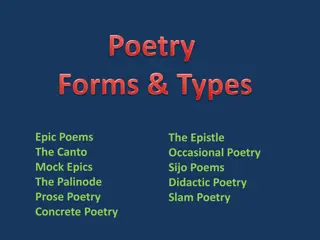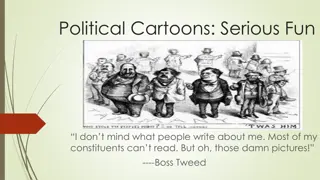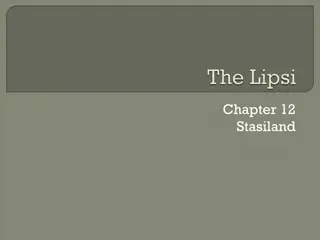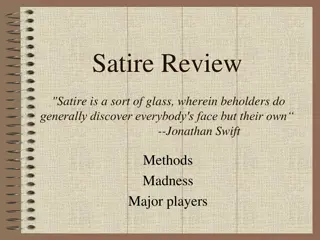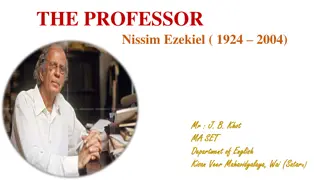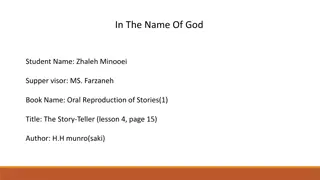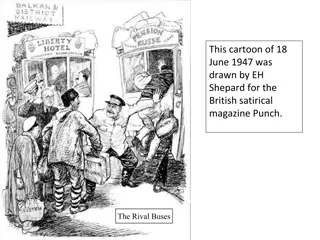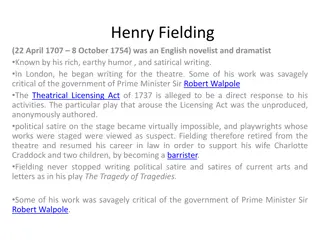Understanding and Teaching "Auto da Compadecida" by Ariano Suassuna
Explore the characters, themes, and literary elements in "Auto da Compadecida" by Ariano Suassuna, offering guidance on discussing the book in the classroom. From analyzing the cover to delving into the satirical and humorous aspects of the play, this instructional material provides insights into th
1 views • 13 slides
Insight into Alexander Borisovich Raskin: Writer, Poet, and Ping Pong Enthusiast
Russian writer and poet Alexander Borisovich Raskin, known for his humorous and satirical works, became famous for his book "When Daddy was a Little Boy." The story "How Daddy Played Ping Pong" showcases his talent and wit. Learn about his life, literary contributions, and why table tennis is called
0 views • 8 slides
The Girl Who Was Plugged In: A Feminist Perspective on Science Fiction
Embark on a journey through the thought-provoking narrative of "The Girl Who Was Plugged In" by James Tiptree Jr. (Alice Bradley Sheldon). Explore the intriguing blend of embodied and disembodied connections, as well as the themes of artificiality, idealized femininity, and societal injustices portr
0 views • 12 slides
Overview of Poetry Genres and Elements for English Students
Explore different genres of poetry including narrative, epic, dramatic, satirical, elegy, fable, and prose poetry. Delve into the unique elements of poetry such as diction and figurative devices like simile and metaphor. Engage with various examples from renowned poets and learn about the aesthetic
1 views • 25 slides
Exploring E.T.A. Hoffmann's "The Sandman": A Study in Romanticism, Irony, and the Uncanny
Delve into the world of E.T.A. Hoffmann's literary masterpiece "The Sandman," where themes of Romanticism versus rationality, irony, and the uncanny intertwine. Through the characters of Nathaniel and Clara, the story explores the tensions between passion and reason, imagination and reality. Dive de
0 views • 12 slides
Analysis of Dario Fo's "Accidental Death of an Anarchist
Dario Fo's play "Accidental Death of an Anarchist" explores themes of police corruption, government collusion, and the suspicious death of an anarchist in police custody. The play delves into issues of impersonation, infiltration, and double-talk, shedding light on societal corruption and manipulati
0 views • 7 slides
Analysis of "The Unknown Citizen" by W. H. Auden
The poem "The Unknown Citizen" by W. H. Auden is a satirical commentary on modern society's dehumanization and loss of individual identity. Through the persona of an unnamed citizen reduced to a mere number, the poem critiques bureaucratic control, conformity, and the erasure of personal agency. The
0 views • 6 slides
The Influence of William Congreve on Restoration Comedy
William Congreve, an English playwright and poet of the Restoration period, is known for his clever and satirical dialogue that influenced the comedy of manners style. The Restoration period marked the end of Cromwell's Commonwealth and the return of monarchy with Charles II. Comedy of manners refle
0 views • 10 slides
Exploring Restoration Drama and Prose in the Era of Charles II
In 1660, with Charles II's ascent to the throne, Restoration literature saw a revival alongside the political landscape. Playwrights like John Dryden and Thomas Otway contributed significant works, with genres ranging from heroic plays to satirical comedies. The era also witnessed the emergence of t
1 views • 12 slides
English Poets of the 17th and 18th Centuries
Explore the works of prominent English poets from 1660 to 1798, including John Dryden and Alexander Pope. Discover their use of rhymed couplets, satirical writings, translations, and contributions to the Age of Reason in the eighteenth century. Delve into the poetic reflections on nature, life, deat
0 views • 10 slides
The Rehearsal and The Antagonists: Satire in Restoration Drama
The Duke of Buckingham's satirical play "The Rehearsal" marked a significant shift in Restoration drama by mocking contemporary heroic plays and literary figures like John Dryden. The play, first performed in 1671, achieved popularity and influenced a tradition of dramatic burlesque on the English s
1 views • 8 slides
Unraveling the Charm of Screwball Comedy Films
Dive into the world of screwball comedy films, a genre that emerged in the mid-1930s, characterized by zany events, witty dialogue, and battles of the sexes. These films disrupt the ordered lives of heroes with the arrival of heroines, leading to humorous misadventures and satirical takes on social
0 views • 7 slides
Deepwater Horizon Disaster and BP Accountability
The Deepwater Horizon drilling rig explosion on April 20, 2010, led to a catastrophic oil spill in the Gulf of Mexico. This tragedy claimed lives, caused environmental damage, and raised concerns about accountability, with BP, Transocean, and Halliburton all implicated. Satirical quotes from comedia
0 views • 5 slides
Exploring Roman Verse Satire Through Bodies: Horace and Persius
Delve into the representation and treatment of bodies in Roman verse satire through the works of Horace and Persius. Analyze how these poets intertwine physical vulnerabilities, personal histories, and societal critique within their satirical compositions. Discover the power of vulnerability in sati
0 views • 14 slides
Exploring the Comedy of Manners in English Literature
Comedy of manners is a genre of realistic, satirical comedy that critiques the social conventions and manners of sophisticated societies. Originating in Classical Greece and flourishing during the Restoration period in England, it employs witty dialogue and clever plots to offer social commentary. N
1 views • 6 slides
Black Comedy: A Hilarious Look at Australian Culture
Black Comedy is a satirical show that cleverly uses humor to highlight aspects of Australian culture through the perspective of Indigenous Australians. The series combines observational sketches, parodies of TV and film, and historical references to provide a fast-paced and entertaining view of soci
4 views • 10 slides
Analysis of Jonathan Swift's "Gulliver's Travels
Jonathan Swift's "Gulliver's Travels" is a satirical novel that follows Lemuel Gulliver through multiple journeys to fictional lands, each representing different aspects of society and human nature. The novel highlights Swift's criticism of politics, society, and intellectual pursuits through Gulliv
4 views • 9 slides
Jonathan Swift: A Satirical Genius and Literary Figure
Jonathan Swift, the author of the classic "Gulliver's Travels," was a major figure in English literature known for his satirical works. Born in Dublin in 1667, Swift overcame personal challenges to become a prominent writer and political commentator. His masterpiece, "Gulliver's Travels," remains a
0 views • 15 slides
Unveiling Satire in Gulliver's Travels
Jonathan Swift's Gulliver's Travels is not just a travel log but a work of satire that cleverly critiques social issues and human weaknesses through the adventures of Lemuel Gulliver. Swift's use of exaggeration and irony in Gulliver's encounters with various societies reflects the satirical underto
0 views • 8 slides
Unveiling the Antifeminist Tradition: Ideological Roots, Textual Sources, and Female Nature
Explore the antifeminist tradition in medieval studies through a deep dive into its ideological roots, main textual sources, and portrayal of female nature. Discover how stereotypes and satirical writings about women's perceived inferiority have persisted throughout history, informed by clerical, in
0 views • 9 slides
Evolution of the 18th Century English Novel
The 18th century marked a significant evolution in English literature, particularly seen in the development of the novel. Key novelists of this period include Daniel Defoe, Samuel Richardson, and Henry Fielding. Their works, such as Robinson Crusoe, Pamela, and Tom Jones, epitomize the various style
0 views • 11 slides
Insights into John Gay's The Beggar's Opera
Explore the satirical brilliance of John Gay's The Beggar's Opera, a groundbreaking play that mocks Italian opera and social inequalities in 18th-century England. Through vivid characters and a captivating storyline set in London, Gay delves into themes of hypocrisy, corruption, and the blurred line
0 views • 11 slides
Explore the World of Epic Poetry: From Heroes to Satire
Uncover the rich tapestry of epic poetry, from the heroic deeds of protagonists in timeless narratives like Beowulf and The Odyssey to satirical parodies such as Mac Flecknoe. Delve into the realms of canto, mock epics, palinodes, and prose poems, each offering a unique perspective on the power of l
0 views • 20 slides
Understanding Political Cartoons: A Satirical Art Form
Political cartoons use humor and satire to convey messages, often poking fun at politicians and societal issues. They employ various techniques like caricature, symbols, metaphors, irony, sarcasm, and stereotypes to make powerful statements. These cartoons can influence public opinion and spark disc
0 views • 8 slides
Allegorical Representation of GDR Oppression in "Stasiland
The imagery in "Stasiland" delves into the symbolism of GDR oppression through cultural artifacts like The Lipsi dance, revealing the manipulative propaganda tactics of the regime. Funder's portrayal of the dance reflects the mechanical nature of the Stasi, shedding light on the absurdity of GDR ide
0 views • 11 slides
Exploring the Art of Satire in Literature
Delve into the world of satire, a literary device that combines humor and criticism to target human flaws and societal issues. Uncover the origins, major types, and key devices used in satire, as well as its significance in critiquing and improving human institutions and behaviors. Understand how sa
0 views • 24 slides
The Professor Nissim Ezekiel - A Satirical Poem on Indian Professors
The Professor is a satirical poem written by Nissim Ezekiel that humorously portrays a typical Indian professor named Professor Seth boasting about his family and mispronouncing words. Ezekiel's subtle and well-crafted diction shines through this dramatic monologue. The poem, awarded the Sahitya Aka
0 views • 7 slides
Exploring the Life and Works of Alexander Borisovich Raskin
A deep dive into the life and works of Alexander Borisovich Raskin, a renowned Russian writer and poet known for his humorous and satirical writing. Born in Belarus in 1914, Raskin studied at the Literary Institute in Moscow and became famous for works like "When Daddy was a Little Boy." Learn about
0 views • 8 slides
The Story-Teller: A Satirical Tale of Moralistic Stories
On a hot afternoon, a group of travelers shares stories in a carriage. The bachelor tells a dark tale that contrasts with the typical moralistic stories the children are used to. Through this satirical narrative, the author challenges conventional notions of goodness and fate.
0 views • 8 slides
Analysis of EH Shepard's 1947 Cartoon on US-USSR Influence in Eastern Europe
British satirical magazine Punch published a cartoon by EH Shepard on 18th June 1947 depicting the US and USSR as rival bus drivers competing for control and influence in Eastern Europe post-World War II. The cartoon symbolizes the struggle for power and alliances in the region, with Hungary and Bul
0 views • 10 slides
The Satirical Legacy of Henry Fielding: A Literary and Social Critique
English novelist and dramatist Henry Fielding is known for his rich humor and satirical writing, which often criticized the government of Prime Minister Sir Robert Walpole. Fielding's works reflected his anti-Jacobite views and support for the Church of England. He delved into writing novels as a fo
0 views • 13 slides
Siegfried Sassoon: War Poet and Satirical Critic
Siegfried Sassoon, a British war poet and soldier, was a prominent figure in World War One. He critiqued the attitudes of senior officers through his realistic and satirical war poetry. "Base Details" by Sassoon reflects on the disconnect between frontline soldiers and base Majors. The poem highligh
0 views • 7 slides
Exploring Gender Inequality Through Aphra Behn's "On Loving Two Equally
Aphra Behn's poem "On Loving Two Equally" serves as a satirical critique of the gender inequality of her time, highlighting the disparities in social censure towards men and women who engage in extramarital relationships. Through the use of humor and juxtaposition, Behn challenges societal norms and
0 views • 4 slides
